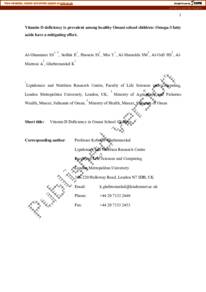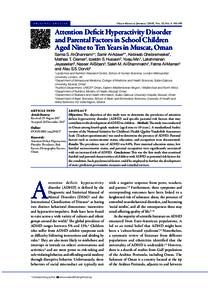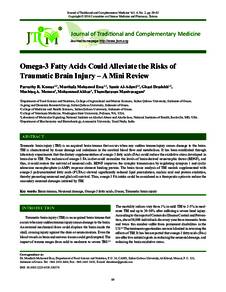Document
Vitamin D deficiency is prevalent among healthy Omani school children : omega-3 fatty acids have a mitigating effect.
Identifier
DOI: 10.1016/j.nut.2015.07.014
Contributors
Sedlak, Eva., Author
Hussein, Izzeldin S., Author
Min, Yoeju., Author
Al-Shmmkhi, Saleh M., Author
Al-Oufi, Hamed S., Author
Al-Mazroui, Ahmed., Author
Ghebremeskel, Kebreab., Author
Other titles
Vitamin D Deficiency in Omani School Children
Publisher
Elsevier.
Gregorian
2016-01
Language
English
English abstract
Objectives: Over the past two decades, the Omani diet has changed considerably to resemble a high calorie and a low nutrient density Western diet. We investigated the fat soluble nutrient status of children before and after intervention with fish diet or fish oil. Methods: Children ages 9 and 10 y (n = 314) were recruited from three randomly selected schools. The schools were assigned to a fish, fish oil, or control group and the children were given a lightly grilled oily fish, a re-esterified triacylglycerol fish oil capsule, or no fish for 12 wk. Results: Plasma vitamin A, beta carotene, vitamin E concentrations, and vitamin E/total lipid ratio at baseline were 2.7 ± 0.85 μmol/L, 0.68 ± 0.48 μmol/L, 21.1 ± 4.8 μmol/L, and 5.0 ± 0.81 μmol/mmol, respectively, and none of the children were deficient. They were severely deficient (<27.5 nmol/L; 10.5% boys and 28.5% girls), deficient (27.5-44.9 nmol/L; 47.6% boys and 49.4% girls) or insufficient (50-74.9 nmol/L; 34.6% boys and 21.5% girls) in vitamin D; only 7.3% boys and 0.6% girls had optimal status (≥75 nmol/L). Parathyroid hormone (5.0 ± 1.7 versus 5.8 ± 2.1 pmol/L; P < 0.0001) and alkaline phosphatase (225.2 ± 66.6 versus 247.8 ± 73.7 U/L; P < 0.01) levels were lower in boys. Postintervention, the fish oil (54.1 ± 17.5 nmol/L; P < 0.001) and fish (49.2 ± 17.4 nmol/L; P < 0.05) groups had elevated levels of vitamin D compared with the controls (42.3 ± 17.5 nmol/L). Conclusions: Vitamin D deficiency is prevalent in Omani school children, but it can be mitigated with omega-3 fatty acid supplementation. Vitamin D plays a crucial role in skeletal and extraskeletal systems. Hence, there is a need for a child-focused program of food fortification and outdoor activities to alleviate the problem.
Member of
ISSN
0899-9007
Resource URL
Category
Journal articles



